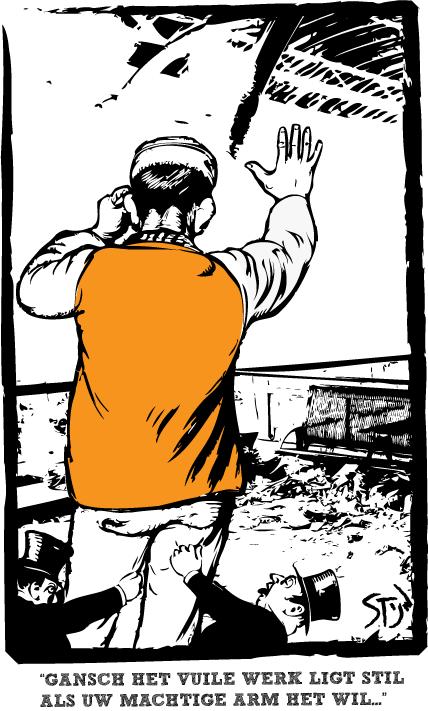
The Dutch are not a very militant people, more given to trashing out labour relations through negotian than through strike action, especially since the agreement the unions reached back in ’82 with the government and employers’ organisations to trade wage rises for employment. Ever since union militancy has been on a low level, with occasional flareups, but mostly existing in a cozy symbiosis with the employers and the government. Not anymore though. The last few years, even before the economic crisis hit, have seen a growing number of disputes and the crisis has given them a new urgency. At the forefront of this new militancy are the cleaners.
The cleaning industry is one of the least organised branches of industry, employing people who have little or no other options for employment, often migrants, legal or otherwise. It’s badly paid and little respected, with the workers only judged on how fast they work. Most if not all cleaning these days is outsourced, which means that any and all cleaning contracts are soley judged on how little they cost, which in turn means a race to the bottom: not gpood for the workers themselves, but little better for their customers.
In the last few years Holland’s biggest union, FNV Bondgenoten (full disclosure: also my union) has been busy organising the cleaners, last year resulting in succesful strike action at Schiphol airport. With the confidence this gave the union went into negations with the cleaning companies for a sector wide binding agreement on cleaners’ wages and benefits. These negotiations failed, with the employers refusing to negotiate seriously about the union’s demands. In response, the union went on strike — which was six weeks ago.
Which makes this strike the longest since 1933! In my own office, at a semi-governmental agency which shall remain nameless, our desks haven’t been cleaned since, while the most public face of the strike are the railway stations, as the Dutch railways is one of the companies suffering from the strike. For those of y’all visiting the Netherlands in the past few weeks; our stations are not normally this filthy. Such a long strike is very undutch as one of the organisers put it (in Dutch).
But what are the cleaners striking for? Not just for better wages, abysmally low as they are now, the cleaners are only asking for two dimes extra per hour for this year and the next. What’s just as important or perhaps even more so is to get respect, the sort of basic amenities white collar workers (like, erm, me) take for granted. Things like training, travel benefits, even being able to use the company canteens where you work. Which is why the cleaners are not just targeting their own companies, but their customers. Customers like the railways, Schiphol Airport, the Free University and the Dutch unemployments benefits agency are role models for how less visible companies treat the cleaners. If they treat them right, others will be less likely to mistreat them and only these sort of big, powerful companies are able to force the cleaning companies to seriously negotiate.
The cleaners’ struggle is an important one not just for the cleaners themselves, but for all workers in the Netherlands. This is not a defensive strike, a defence of existing rights, but an offensive strike, to build up new rights, part of the union’s broader strategy to mobilise and improve the rights of workers in the weakest, least organised parts of the “labour market”. If it succeeds, it will be a powerful step forward for FNV Bondgenoten; if it fails…